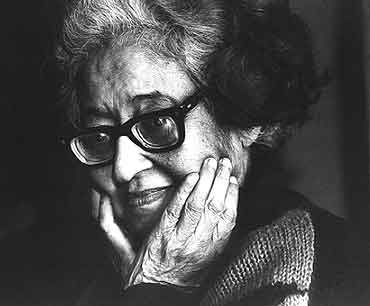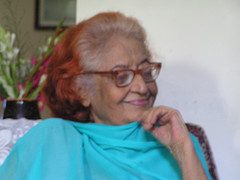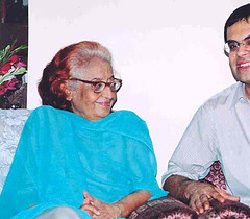by Raza Rumi
 I have been upset the entire day. Perhaps it does not matter in the larger scheme of things. But this is a sad, sad day. Qurratulain Hyder, the literary giant of our times is no more. At a personal level it is not just the death of another literary figure but it is far greater and deeper than that. Ainee inspired generations of Urdu readers and there is not a single Urdu writer of post-independence era who has not been influenced by her.
I have been upset the entire day. Perhaps it does not matter in the larger scheme of things. But this is a sad, sad day. Qurratulain Hyder, the literary giant of our times is no more. At a personal level it is not just the death of another literary figure but it is far greater and deeper than that. Ainee inspired generations of Urdu readers and there is not a single Urdu writer of post-independence era who has not been influenced by her.
Ainee had a civilizational consciousness that took us beyond the nation-state identities that we are so familiar with in our everyday lives. And, of course there was romance – the notion of eastern and Indic romance – that touched our lives. As I wrote earlier, that the way I have understood the world and perhaps parts of myself were deeply influenced by Ainee.
And  now her death is a blow that this source of inspiration is not there anymore; as it is we are living in barren times where literature is about marketing and packaging and catering to consumers.
now her death is a blow that this source of inspiration is not there anymore; as it is we are living in barren times where literature is about marketing and packaging and catering to consumers.
Ainee primarily wrote for herself but reached out and made her mark – and in the process she connected with millions of readers. And I am just one of them. My friends and I have talked today and we recounted how she shaped our inner lives.
 I have at least avoided a regret – I met her after years of longing. Met her twice at her house in her frail state and enjoyed the hours. The impressions were indelible. Of course, the ambitious self had planned a meeting later this year.
I have at least avoided a regret – I met her after years of longing. Met her twice at her house in her frail state and enjoyed the hours. The impressions were indelible. Of course, the ambitious self had planned a meeting later this year.
But there will be nobody in that Noida house. That little temple opposite her house will remain and the sound of Azaan from a neighbouring mosque will also heard. But the hearty laughter, quick witted lines and inimitable writings will not be there.
However, as a friend said – writers die, their stories don’t -makes me a little content.
Farewell, Ainee Apa. May God keep you happy wherever you are…
Photo Credits: The black-and-White photo in this post is courtesy of Prashant Panjiar




















































Pervaiz Bhai, no Urdu will not die in India. The worst phase is over. jitna Urdu ki tabaahi honii thii voh to ho chuki hindustan meN, ab isse zyaada kyaa hogi.
She didn’t subscribe to Pakistan! I don’t think so. Of course, in civilisational sense she considered the whole area as one geographical unit, the sub-continent or barr-e-sagheer.
Some big novels have been written in recent years in India. Syed Mohamamd Ashraf, Shamoil Ahmad, Ghazanfar, Shaukat Hayat, Musharraf Alam Zauqi and numerous others are writing. Nambardal ka Neela, was a major novel by Ashraf.
No doubt this is not the age when great literature is written. This is the feeling world over. Readers are less in Urdu in India, it is true. But certain regions have potential. In Maharashtra, Bihar, Urdu is doing well.
Prose writing in India is slightly better than in Pakistan though in poetry Pakistani Urdu poetry is far ahead of contemporary Urdu shaaeri in India.
Even in pre-independent era when Urdu was lingua franca, the lack of purchasing power of Urdu masses had forced Prem Chand to switch to Hindi because the circulation of Hindi books was less but patronage by Seths of aggressive Hindi revivalists ensured that writers in Hindi got good money. Urdu masses rarely bought books and one book bought was read by numerous families.
It continued until the Nikhat publication from Allahabad arrived on the scene and Ibn-e-Safi craze swept the country. Now the purchasing power of Muslims in India has improved.
For the first time in history, an Urdu newspaper (Roznama Sahara) in India has gone well past the figure of 1 lakh circulation and is published from not just Delhi, Lucknow and Patna but also Gorakhpur, Kanpur, Hyderabad, Mumbai, Bangalore amongst others.
One lakh is not a big figure for Pakistan. But considering that in India, Urdu-speakers are a minority in many states, 10-12% and even amongst them not all literate, and have poor network of distributors and agents.
what a loss. My own interest in urdu literature took root after reading Aag ka Darya. As if Qurut-ul- ain Haider personally came to me through her book and woke me from a deep slumber to the wonders of Urdu.In every sense of the word I became alive then and remained a devotee of her writings ever since. It feels like I have lost a dear friend. May she rest in eternal peace.
May her soul rest in peace. May Allah showers blessing on her. I read her novel and only thing I remember now is that I enjoyed and found myself immersed into the characters. It was a pure delight.
I sincerely hope this discussion will not turn into being about where she lived. Let us remember her for her contributions to Urdu literature to keep the craft of the kahani not just alive but thriving. Let us please respect her memory in her death. She was clearly an inspiration to Urdu writers and readers and it is befitting that we remember her with dignity. Maybe the best tribute for a writer is to pick up something by them and read it. Whether you have ever read smething by her or not, I am convinced if you do today you will be moved.
Yes Raza this is indeed a sad day for Urdu and Urdu lovers. I read the news at BBC this morning. I am afraid that with the demise of people like Qurrat-ul-Ain Haider and others, Urdu language in India will die with them and it will be left up to Pakistanis to keep this beautiful language alive. Unfortunately in Pakistan too Urdu has taken a political color whereas it should not have. Urdu is our heritage and defines us who we are. She even though lived in India and did not subscribe to Pakistan was nevertheless one of us. May God almighty bless her soul.